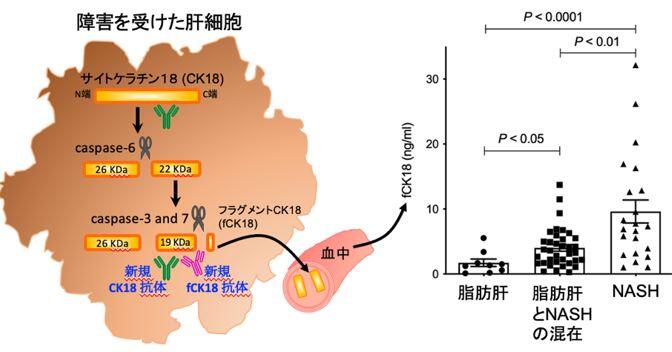Summary of our research
Caspase-generated fragmented cytokeratin 18 (fCK18) is recognized as a useful noninvasive biomarker in the diagnosis of nonalcoholic fatty liver disease (NAFLD), particularly nonalcoholic steatohepatitis (NASH). However, fCK18 measurement is not applied clinically due to widely variable cut-off values under the current enzyme-linked immunosorbent assay platform. Therefore, we developed a highly sensitive chemiluminescent enzyme immunoassay using newly developed monoclonal antibodies against fCK18 and investigated its relevance in NASH diagnosis. Serum fCK18 levels were significantly associated with NAS, Brunt's grade/stage, Matteoni's classification, portal inflammation, and fat accumulation in the liver. Notably, hepatocyte ballooning was the only independent variable significantly associated with serum fCK18 in the multivariate linear regression analysis. Serum fCK18 levels were significantly elevated in patients with NAFLD and nonalcoholic fatty liver (NAFL) compared to healthy individuals. They were also significantly elevated in patients with NAFL compared to NASH defined by NAS or Matteoni's classification, with area under the curve values being 0.961 (NAFLD vs. healthy), 0.913 (NAFL vs. healthy), 0.763 (NASH vs. NAFL), and 0.796 (NASH type 3-4 vs. NAFL type 1-2). These results were confirmed by a validation cohort. Notably, changes over time in serum fCK18 levels were significantly correlated with changes in ALT, AST, and the fibrosis-4 index in 25 patients who underwent lifestyle modification. Serum fCK18 levels were significantly correlated with liver damage associated with NASH pathology. Serum fCK18 levels are accurate in distinguishing patients with NAFL or NASH from healthy individuals and may be useful to monitor NASH over time.

Researcher information
EGUCHI Akiko
Associate Professor, Department of Gasteroentelorogy and Hepatology, Graduate School of Medicine
Specialized area:
Cell biology, Gastroenterology, Hepatology, Gene delivery
Current research field:
Molecular mechanisms in the progression of chronic liver diseases with complications
IWASA Motoh
Associate Professor, Department of Gasteroentelorogy and Hepatology, Graduate School of Medicine
Specialized area:
Gastroenterology, Hepatology
Current research field:
Development of biomarkers in chronic liver diseases with complications
WATANABE Masatoshi
Professor, Department of oncologic pathology, Graduate School of Medicine
Specialized area:
Oncology, Pathology
Current research field:
Microenviroument of prostate cancer, Development of novel cell culture system, nanomedicine, nanotoxicology
NAKAGAWA Hayato
Professor, Department of Gasteroentelorogy and Hepatology, Graduate School of Medicine
Specialized area:
Gastroenterology, Hepatology, Oncology
Current research field:
Molecular mechanisms of hepatobiliary injury and carcinogenesis